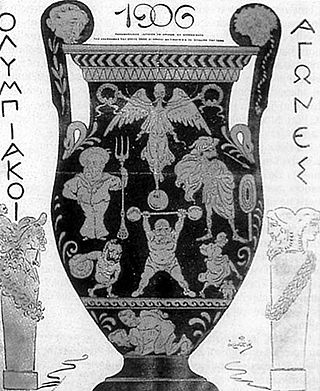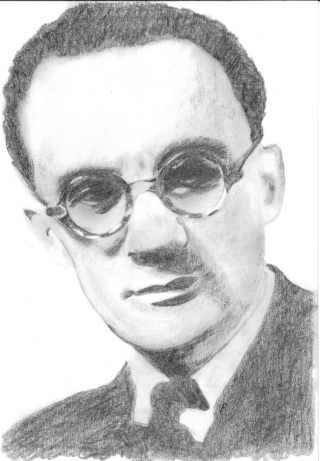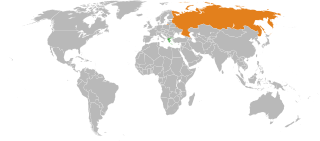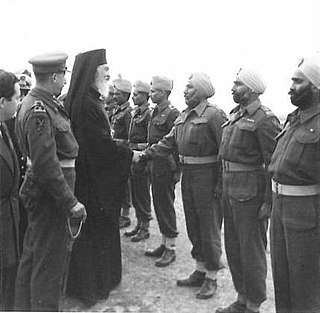
Phidias or Pheidias was an Ancient Greek sculptor, painter, and architect, active in the 5th century BC. His Statue of Zeus at Olympia was one of the Seven Wonders of the Ancient World. Phidias also designed the statues of the goddess Athena on the Athenian Acropolis, namely the Athena Parthenos inside the Parthenon, and the Athena Promachos, a colossal bronze which stood between it and the Propylaea, a monumental gateway that served as the entrance to the Acropolis in Athens. Phidias was the son of Charmides of Athens. The ancients believed that his masters were Hegias and Ageladas.
Cephalus is a name used both for the hero-figure in Greek mythology and carried as a theophoric name by historical persons.

The 1906 Intercalated Games or 1906 Olympic Games was an international multi-sport event that was celebrated in Athens, Greece. They were at the time considered to be Olympic Games and were referred to as the "Second International Olympic Games in Athens" by the International Olympic Committee. However, the medals that were distributed to the participants during these games are not officially recognised by the Olympic Committee and are not displayed with the collection of Olympic medals at the Olympic Museum in Lausanne, Switzerland.

Otto was a Bavarian prince who ruled as King of Greece from the establishment of the Kingdom of Greece on 27 May 1832, under the Convention of London, until he was deposed on October 1862.

Souvlaki is a Greek fast food consisting of small pieces of meat and sometimes vegetables grilled on a skewer. It is usually eaten straight off the skewer while still hot. It can be served with or inside a rolled pita, typically with lemon, sauces, vegetables such as sliced tomato and onion, and fried potatoes as a side. The meat usually used in Greece and Cyprus is pork, although chicken, beef, and lamb is used in Turkish kitchens.

Nikos Skalkottas was a Greek composer of 20th-century classical music. A member of the Second Viennese School, he drew his influences from both the classical repertoire and the Greek tradition. He also produced a sizeable amount of tonal music in the last phase of his musical creativity.

In several of the autocephalous Eastern Orthodox churches and Eastern Catholic Churches, the patriarch or head bishop is elected by a group of bishops called the Holy Synod. For instance, the Holy Synod is a ruling body of the Georgian Orthodox Church.

The 2004 Summer Olympics, officially known as the Games of the XXVIII Olympiad, were a summer multi-sport event held in Athens, the capital city of Greece, from 13 to 29 August 2004. A total of 10,625 athletes from 201 countries represented by National Olympic Committees participated in these games, competing in 301 events in 28 sports. Kiribati and Timor Leste competed for the first time in these Olympic Games.
Greek Cypriots are the ethnic Greek population of Cyprus, forming the island's largest ethnolinguistic community. According to the 2011 census, 659,115 respondents recorded their ethnicity as Greek, forming almost 99% of the 667,398 Cypriot citizens and over 78% of the 840,407 total residents of the area controlled by the Republic of Cyprus. These figures do not include the 29,321 citizens of Greece residing in Cyprus, ethnic Greeks recorded as citizens of other countries, or the population of Northern Cyprus.

Prince Nicholas of Greece and Denmark, of the Glücksburg branch of the House of Oldenburg, was the fourth child and third son of King George I of Greece, and of Queen Olga. He was known as "Greek Nicky" within the family to distinguish him from his cousin Emperor Nicholas II of Russia. Prince Nicholas was a talented painter, often signing his works as "Nicolas Leprince."

The Super League Greece 1, or Stoiximan Super League for sponsorship reasons, is the highest professional association football league in Greece. The league was formed on 16 July 2006 and replaced Alpha Ethniki at the top of the Greek football league system. The members of the cooperative are the Football Limited Companies (P.A.E.) that have the right to participate in the Super League 1 championship.
Sokratis Kokkalis is a Greek businessman. His father, Petros Kokkalis, was a communist politician and Greek Resistance member, living in exile in East Germany after the end of the Greek Civil War.

The Catholic Church in Greece is part of the worldwide Catholic Church, under the spiritual leadership of the Pope in Rome. Indigenous Roman Catholic Greeks numbered about 50,000-70,000 in 2022 and were a religious and not an ethnic minority. Most of them are a remnant of Venetian and Genoese rule in southern Greece and many Greek islands from the early 13th until the late 18th century, Greeks who converted to Catholicism or descendants of the thousands of Bavarians that came to Greece in the 1830s as soldiers and civil administrators, accompanying King Otto. One very old but still common term to reference to them is Φράγκοι, or "Franks", dating to the times of the Byzantine Empire, when medieval Greeks would use that term to describe all Catholics.

The official language of Greece is Greek, spoken by 99% of the population. In addition, a number of non-official, minority languages and some Greek dialects are spoken as well. The most common foreign languages learned by Greeks are English, German, French and Italian.
Religion in Greece is dominated by Christianity, in particular the Greek Orthodox Church, which is within the larger communion of the Eastern Orthodox Church. It represented 90% of the total population in 2015 and is constitutionally recognized as the "prevailing religion" of Greece. Religions with smaller numbers of followers include Islam, Roman Catholicism, Greek Catholicism, Judaism, Evangelicalism, Hellenic paganism, and Jehovah’s Witnesses. Also a small number of Greek atheists exist, not self-identifying as religious. Religion is key part of identity for most Greeks, with 76% of Greeks in a 2015–2017 survey saying that their nationality is defined by Christianity. According to other sources, 81.4% of Greeks identify as Orthodox Christians and 14.7% are atheists.

Greece has an embassy in Berlin and five General Consulates in Hamburg, Munich, Düsseldorf, Stuttgart and Frankfurt. Germany has an embassy in Athens and a General Consulate in Thessaloniki. Germany and Greece are full members of the Organization for Security and Co-operation in Europe, of the Organisation for Economic Co-operation and Development, of NATO, of the European Union, and of the Eurozone.

Greco-Russian relations are the bilateral foreign relations between Greece and Russia. The two countries first entered into diplomatic relations in 1828. Both Greece and Russia are members of international organizations and agreements, including the United Nations, Organization for Security and Cooperation in Europe, and the Organization of the Black Sea Economic Cooperation.
Rugby union in Greece is a minor but growing sport.

Sikhism in Greece dates back to the early 1900s, where many Sikhs came to the country through British Indian Army in the World War I and World War II. As of 2012, there are approximately 20,000 Sikhs in Greece. The Sikh population in Greece has grown over the years, with many Sikhs migrating to the country for agricultural work or to start their own businesses.
Greek Venezuelans are Venezuelan residents who are either fully or partially of Greek descent, or a Greece-born person who resides in Venezuela. They are mostly located in the north-center of Venezuela, concentrated in Caracas and Valencia.













